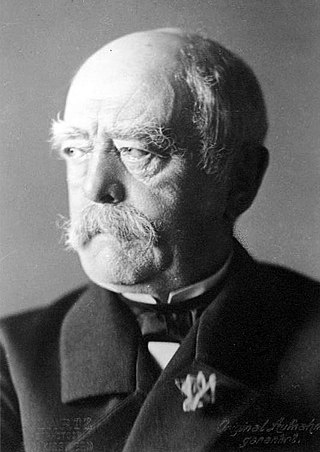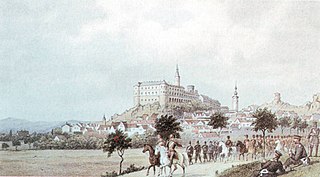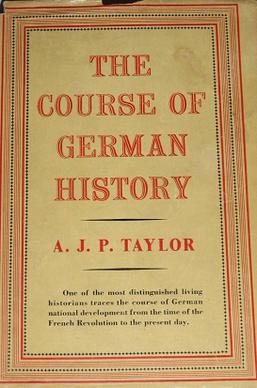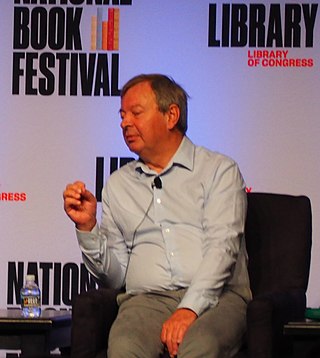
Otto, Prince of Bismarck, Count of Bismarck-Schönhausen, Duke of Lauenburg was a Prussian statesman and diplomat who oversaw the unification of Germany. Bismarck's Realpolitik and firm governance resulted in his being popularly known as the Iron Chancellor.

Alan John Percivale Taylor was a British historian who specialised in 19th- and 20th-century European diplomacy. Both a journalist and a broadcaster, he became well known to millions through his television lectures. His combination of academic rigour and popular appeal led the historian Richard Overy to describe him as "the Macaulay of our age". In a 2011 poll by History Today magazine, he was named the fourth most important historian of the previous 60 years.

Hugh Redwald Trevor-Roper, Baron Dacre of Glanton, was an English historian. He was Regius Professor of Modern History at the University of Oxford.
The Reinsurance Treaty was a diplomatic agreement between the German Empire and the Russian Empire that was in effect from 1887 to 1890. The existence of the agreement was not known to the general public, and as such, was only known to a handful of officials in Berlin and St. Petersburg. The treaty played a critical role in German Chancellor Otto von Bismarck's network of alliances and agreements, which aimed to keep the peace in Europe as well as maintaining Germany's economic, diplomatic and political dominance. It helped calm tensions between both Russia and Germany.
Celia Elizabeth Green is a British parapsychologist and writer on parapsychology.
State Socialism was a set of social programs implemented in the German Empire that were initiated by Otto von Bismarck in 1883 as remedial measures to appease the working class and detract support for socialism and the Social Democratic Party of Germany following earlier attempts to achieve the same objective through Bismarck's Anti-Socialist Laws. As a term, it was coined by Bismarck's liberal opposition to these social welfare policies, but it was later accepted by Bismarck. This did not prevent the Social Democrats from becoming the biggest party in the Reichstag by 1912. According to historian Jonathan Steinberg, "[a]ll told, Bismarck's system was a massive success—except in one respect. His goal to keep the Social Democratic Party out of power utterly failed. The vote for the Social Democratic Party went up and by 1912 they were the biggest party in the Reichstag".

Fritz Richard Stern was a German-born American historian of German history, Jewish history and historiography. He was a University Professor and a provost at New York's Columbia University. His work focused on the complex relationships between Germans and Jews in the 19th and 20th centuries and on the rise of National Socialism in Germany during the first half of the 20th century.
Sonderweg refers to the theory in German historiography that considers the German-speaking lands or the country of Germany itself to have followed a course from aristocracy to democracy unlike any other in Europe.

The Peace of Prague was a peace treaty signed by the Kingdom of Prussia and the Austrian Empire at Prague on 23 August 1866. In combination with the treaties of Prussia and several south - and central German states it effectively ended the Austro-Prussian War.

The Treaty of Versailles of 1871 ended the Franco-Prussian War and was signed by Adolphe Thiers of the Third French Republic and Otto von Bismarck of the newly formed German Empire on 26 February 1871. A preliminary treaty, it was used to solidify the initial armistice of 28 January between the powers. It was ratified by the Treaty of Frankfurt on 10 May of the same year which confirmed the supremacy of the German Empire, replacing France as the dominant military power on the European continent.
Vivian Hunter Galbraith was an English historian, fellow of the British Academy and Oxford Regius Professor of Modern History.
Geoffrey Albert Wheatcroft is a British journalist, author, and historian.

The causes of the Franco-Prussian War are deeply rooted in the events surrounding German unification. In the aftermath of the Austro-Prussian War (1866), Prussia had annexed numerous ethnically German territories and formed the North German Confederation with other German territories. Prussia then turned its attention towards the south of Germany, where it sought to expand its influence.

The Origins of the Second World War is a non-fiction book by the English historian A. J. P. Taylor, examining the causes of World War II. It was first published in 1961 by Hamish Hamilton.

The Struggle for Mastery in Europe 1848–1918 is a scholarly history book by the English historian A. J. P. Taylor and was part of "The Oxford History of Modern Europe", published by the Clarendon Press in Oxford in October 1954.

The Course of German History is a non-fiction book by the English historian A. J. P. Taylor. It was first published in the United Kingdom by Hamish Hamilton in July 1945. This influential work offers a critical examination of German history, spanning from the Holy Roman Empire through to the end of World War II, arguing that the course of German history was a natural progression towards militarism and dictatorship. Taylor provocatively suggests that the Nazi regime was an inevitable outcome of German history, rather than an aberration. The book was written during the later stages of World War II and reflects the author's attempt to understand and explain the rise of Adolf Hitler and the National Socialist movement within the broader context of German history. "The Course of German History" has sparked considerable debate among historians and scholars for its deterministic view of history and its controversial interpretations. Despite criticisms, it remains a seminal and widely discussed work in the field of German studies and historiography, noted for its engaging narrative style and its challenge to traditional views on German history.
The French indemnity was the indemnity the French Third Republic paid to the German Empire after the French defeat in the Franco-Prussian War in 1871.
Betty Kemp was an English historian specialising in the British constitution. She lectured at the University of Manchester, before moving to the St Hugh's College, Oxford where she was a Tutor, and later a Fellow in Modern History, and Fellow Emerita.

Adam Sisman is a British writer, editor and biographer. He received the National Book Critics Circle Award for his second book, Boswell's Presumptuous Task. He is a Fellow of the Royal Society of Literature and an Honorary Professor of the University of St Andrews.

The General: Charles de Gaulle and the France He Saved is a non-fiction book authored by the British historian and journalist Jonathan Fenby. Published in 2010 by Simon & Schuster, the biography details the life and times of the iconic French statesman Charles de Gaulle, with the 20th-century history of the senior general and politician's nation also receiving focus.












